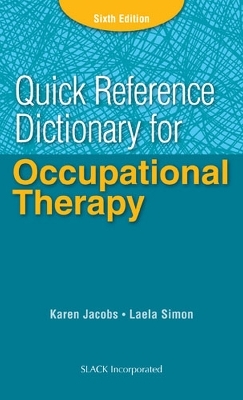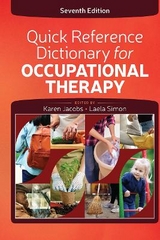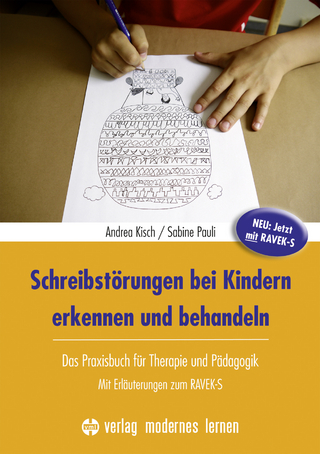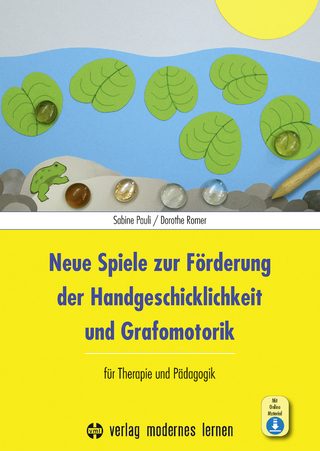
Quick Reference Dictionary for Occupational Therapy
SLACK Incorporated (Verlag)
978-1-61711-646-9 (ISBN)
- Titel erscheint in neuer Auflage
- Artikel merken
Quick Reference Dictionary for Occupational Therapy has been a leading resource for more than 15 years and has provided occupational therapy professionals and students with pertinent information right at their fingertips. Now revised and updated into a Sixth Edition, this pocket-size resource includes the latest information in the field of occupational therapy.
Quick Reference Dictionary for Occupational Therapy, Sixth Edition by Dr. Karen Jacobs and Laela Simon remains the only comprehensive dictionary available specifically for occupational therapy. The handy, conveniently sized dictionary provides a quick reference to words, their definitions, and important resources used in daily practice and academic training.
The changes in diagnoses that have recently occurred, as well as changes in the U.S. health care system, have also been incorporated into this Sixth Edition. Nearly 4,000 terms are defined and more than 70 appendices are included.
Some of the 70 new appendices include:
Useful Apps for Occupational Therapy
Evidence-Based Practice, Levels of Evidence, and Qualitative Research
Stages of Alzheimer’s Disease – Seven Stages From the Alzheimer’s Foundation
Energy Conservation Techniques
Nutrition
Safe Patient Handling and Movement Skills
Thoracic Outlet Syndrome
Grip Development and Stages of Writing
Occupational therapy and occupational therapy assistants, clinicians, faculty, and students will benefit from the easy-to-use format and updated information that Quick Reference Dictionary for Occupational Therapy, Sixth Edition has to offer. This valuable tool can be used by students completing fieldwork and new practitioners just starting out, and also serves as a handy reference for seasoned practitioners.
Karen Jacobs, EdD, OTR/L, CPE, FAOTA is a past president and vice president of the American Occupational Therapy Association, received the 2011 Eleanor Clarke Slagle Lectureship, and was a 2005 recipient of a Fulbright Scholarship to the University of Akureyri in Akureyri, Iceland. Karen is a clinical professor and the program director of the On-Line Post-Professional Doctorate in Occupational Therapy (OTD) program at Boston University, Boston, Massachusetts. She earned a doctoral degree at the University of Massachusetts, a Master of Science in occupational therapy at Boston University, and a Bachelor of Arts at Washington University in St. Louis, Missouri. Karen’s research examines the interface between the environment and human capabilities. In particular, she examines the individual factors and environmental demands associated with increased risk of functional limitations among populations of university and middle school-aged students, particularly in notebook computing, use of tablets, and backpack use. She is also part of a 5-year study entitled, Project Career: Development of an Interprofessional Demonstration to Support the Transition of Students With Traumatic Brain Injuries From Postsecondary Education to Employment. In addition to being an occupational therapist, Karen is also a certified professional ergonomist and the founding editor of the international, interprofessional journal WORK: A Journal of Prevention, Assessment and Rehabilitation (http://blogs.bu.edu/kjacobs/). Karen is a faculty-in-residence and lives in an apartment in one of the dormitories at Boston University. She is the mother of three children—Laela, Joshua, and Ariel—and the amma (grandma in Icelandic) to Sophie, Zachary, Liberty, and Zane. She balances work with occupations such as cross-country skiing, kayaking, photography, and travel. Laela Simon, OTR/L received her degree in occupational therapy from Florida Agricultural and Mechanical University, Tallahassee, Florida. She practiced for more than 10 years as a rehabilitation coordinator/manager with expertise in vestibular, neurological, and orthopedic rehabilitation. Currently, Laela is a school-based occupational therapist in Connecticut, where she provides services to children with a variety of different diagnoses; she also has a consulting practice. Laela is passionate about teaching handwriting to children and spends time volunteering her expertise at local preschools and elementary schools. Laela and her husband, Craig, are the proud parents of Sophie and Zachary. Laela balances work with occupations such as music, art, travel, and spending time with her family.
Dedication
Acknowledgments
About the Editors
Introduction
Dictionary of Terms
References
List of Appendices
Appendix 1 Acronyms and Abbreviations: General
Appendix 2 Acronyms: Evaluations
Appendix 3 Acronyms: Organizational
Appendix 4 Adaptive Nutrition
Appendix 5 American Occupational Therapy Association Core Values and Attitudes of Occupational Therapy Practice
Appendix 6 American Occupational Therapy Association’s Past Presidents
Appendix 7 American Occupational Therapy Association Statements
Appendix 8 Basic Signs and Tips for Communicating With Individuals With Hearing Impairments
Appendix 9 Bones of the Body
Appendix 10 Braille Alphabet
Appendix 11 Brunnstrom’s Stages of Recovery
Appendix 12 Burn Chart—Rule of Nines
Appendix 13 Classifications of Seizures and Epilepsy
Appendix 14 Cranial Nerves
Appendix 15 Dermatomes
Appendix 16 Descriptions of Occupational Therapy
Appendix 17 Diseases, Pathologies, and Syndromes Defined
Appendix 18 Energy Conservation Techniques
Appendix 19 Evidence-Based Practice, Levels of Evidence, and Qualitative Research
Appendix 20 Frames of Reference Used in Occupational Therapy
Appendix 21 Functional Abilities by Spinal Cord Injury Level
Appendix 22 Glasgow Coma Scale
Appendix 23 Glossary and Definitions of Terms Used in the Initial Health Assessment/ Refugee Health Assessment
Appendix 24 Grading Edema
Appendix 25 Grading for Balance: Graded Posture Movement Ability of Individual
Appendix 26 Grasp and Pinch Averages
Appendix 27 Grip Development and Stages of Writing
Appendix 28 Growth and Development in Early Childhood
Appendix 29 Guidelines for Blood Pressure Management in Adults and Target Heart Rate
Appendix 30 Health Literacy
Appendix 31 International Classification of Functioning, Disability and Health
Appendix 32 Laboratory Values
Appendix 33 Legislation and Policy Decisions Affecting Rehabilitation
Appendix 34 Levels of Assistance
Appendix 35 Manual Muscle Testing
Appendix 36 Measures and Weights
Appendix 37 Medical Roots Terminology
Appendix 38 Metabolic Equivalent (MET) Values for Activity and Exercise
Appendix 39 Metric and English Conversion
Appendix 40 Metric System
Appendix 41 Muscles of the Body
Appendix 42 Muscles: Origin/Insertion/ Action—Innervation—Blood Supply
Appendix 43 Nutrition
Appendix 44 Pharmacology
Appendix 45 Positive Language
Appendix 46 Rancho Los Amigos Scales of Cognitive Functioning
Appendix 47 Range of Motion
Appendix 48 Range of Motion: Illustrations
Appendix 49 Reflex/Reaction
Appendix 50 Safe Patient Handling and Movement Skills for Occupational Therapy Practitioners and Students
Appendix 51 Splints
Appendix 52 Stages of Alzheimer’s Disease
Appendix 53 Stages of Alzheimer’s Disease: Seven Stages From the Alzheimer’s Foundation
Appendix 54 Stages of Decubitus Ulcers
Appendix 55 Statistics: Basic
Appendix 56 Symbols
Appendix 57 Thoracic Outlet Syndrome
Appendix 58 Total Hip Precautions
Appendix 59 Useful Spanish Phrases
Appendix 60 Useful Spanish Words
Appendix 61 Visual Impairment
Appendix 62 Wheelchair Measurement Procedures
Appendix 63 Workstation Checklist
| Sprache | englisch |
|---|---|
| Maße | 152 x 229 mm |
| Themenwelt | Schulbuch / Wörterbuch ► Lexikon / Chroniken |
| Medizin / Pharmazie ► Physiotherapie / Ergotherapie ► Ergotherapie | |
| Technik | |
| ISBN-10 | 1-61711-646-7 / 1617116467 |
| ISBN-13 | 978-1-61711-646-9 / 9781617116469 |
| Zustand | Neuware |
| Informationen gemäß Produktsicherheitsverordnung (GPSR) | |
| Haben Sie eine Frage zum Produkt? |
aus dem Bereich



